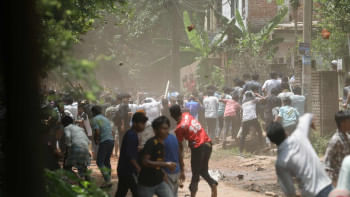The Left's fate in balance
The legislature election process is about to begin in four Indian states: West Bengal, Tamil Nadu, Kerala and Assam. The elections could prove a turning point for the Congress, the Tamil Nadu-based Dravida Munnetra Kazhagham (DMK), its rival AIADMK, the Asom Gana Parishad (AGP) and above all, the Left.
In Tamil Nadu, the DMK-Congress alliance faces a tough challenge from Ms. Jayalalitha's AIADMK-led alliance including the Left, which would benefit disproportionately from even a slight decline in the DMK's vote-share (26.5% in 2006). Ms. Jayalalitha's party commands about a third of the vote.
If the DMK-led coalition wins, the Congress can be in governmentfor the first time since 1967 -- because the DMK will probably have to share power. It has consolidated its influence over various institutions, including the media, by fully exploiting both its power in the state and the central governments over 12 years.
Yet, the DMK isn't going into battle with great confidence. It's trying to lure voters with promises of gifts, including free laptops for college students, a kitchen mixer or a grinder for every family, and a Rs.4 lakh grant to single women-headed households.
The AIADMK is matching this with, among promises of other gifts, laptops for Class XI and older students, a fan, a mixer and a grinder for each household, 20 kg of free rice every month, besides 60,000 cows!
Such competitive populism isn't confined to Tamil Nadu. In Assam, the Congress under Chief Minister Tarun Gogoi has promised 9 lakh new jobs and a doubling of the monthly quota of 20 kg of rice to all below-poverty-line (BPL) families.
Whether Mr. Gogoi wins or not will partly depend on whether Assam's Muslims, 30% of the population, support the Congress or the predominantly Muslim, All-India United Democratic Front (AIUDF).
The AIUDF would have liked to cultivate the AGP, but the AGP has a tacit understanding with the BJP: the two aren't fielding strong candidates against each other. Luckily for the Congress, separatist groups, which call for election boycotts, have been greatly weakened.
However, it's in West Bengal and, to an extent, Kerala that the most dramatic changes could occur. In West Bengal, the Left Frontin office for an uninterrupted 34 years, a world recordis in decline and faces anti-incumbency.
It won 227 of the 294 Assembly seats in 2006, with a 48.4% vote-share. By the 2009 Lok Sabha election, it only led in 99 Assembly segments, with a 43.5% vote-share. It also lost recent local body elections and various by-elections. Besides, the opposition is now firmly united under Ms. Mamata Banerjee's Trinamool Congress.
The Left Front's support-base has eroded because its land reform and other progressive measures lost momentum, and it pursued thoughtlessly pro-corporate policies ignoring people's basic needs and livelihood issues. The state's health and education indices have stagnated or fallen, knocking out its claim to inclusive pro-people development.
The Left's image as a force of radical change and social transformation doesn't mean much to the 60 percent-plus Bengalis who were born after the Front came to power.
The Left Front's brutal crushing of grassroots resistance against unjust neo-liberal policies at Singur and Nandigram earned it popular ill-will and hostility. The Front hasn't learned enough lessons from these fiascos.
Ms. Banerjee has exploited the Left's failures. Sections of the extreme Left and the middle-class intelligentsia have extended support to her. She has bullied the Congress into accepting a measly 65 tickets.
The Left will put up a fight, but it faces an uphill task. If the Left loses in West Bengal, it will suffer not just ignominy, but also intense repression from the lumpen TMC.
Even if the Left clings on to power, it will be much weakened, with little freedom to try innovative approaches to regain lost ground. Some Left supporters believe that an electoral defeat will help the Left rethink its strategic perspectives and economic and social policies.
In Kerala too, the Left Democratic Front isn't well-placed to win. The state tends to alternate between the LDF and the Congress-led United Democratic Alliance at elections. Moreover, the LDF faces anti-incumbency because of its poor performance in public services delivery and charges of corruption.
The biggest charges implicate the Communist Party of India Marxist's (CPM) state secretary Pinarayi Vijayan for allegedly receiving kickbacks in a scam involving a Canadian company. Mr. Vijayan is the first Politburo member of an Indian communist party to face a CBI inquiry.
Mr. Vijayan has tried to undo many of Chief Minister V.S. Achuthanandan's progressive measures, on the spurious ground that they are "old-fashioned." What the young generation needs in Kerala, Mr. Vijayan argues, is not education, healthcare and jobs in small industries, agriculture and plantations, but expressways, entertainment parks, and service-sector jobs like those in Information Technology. But these jobs haven't materialised.
The CPM leadership made another blunder by not presenting Mr. Achuthanandan as its chief ministerial candidatethanks to pressure from Mr. Vijayan.
The Left parties' Lok Sabha tally fell from 61 in 2004 to 24 in 2009. A defeat in West Bengal and Kerala would marginalise the Left in Parliament.
Yet, the Left shouldn't be written off. It continues to be strong in trade unions and women's movements. But it can reverse its decline only if it overhauls its politics, mobilisation strategy and organisational structures.
The Left's decline will push India's political centre of gravity further to the Right. This would be tragic. Indian society should naturally favour Left-of-centre politics, with empowerment of the poor and emancipatory policies at its core.
However, the Left's decline won't push India towards either a monochromatic politics or a bipolar system dominated by the Congress and the BJP. The Indian polity has become too polycentric, with Dalit and OBC upsurges, rise and consolidation of regional parties, and social movements which resist the onslaught of neliberalism and globalisation.

 For all latest news, follow The Daily Star's Google News channel.
For all latest news, follow The Daily Star's Google News channel. 



Comments